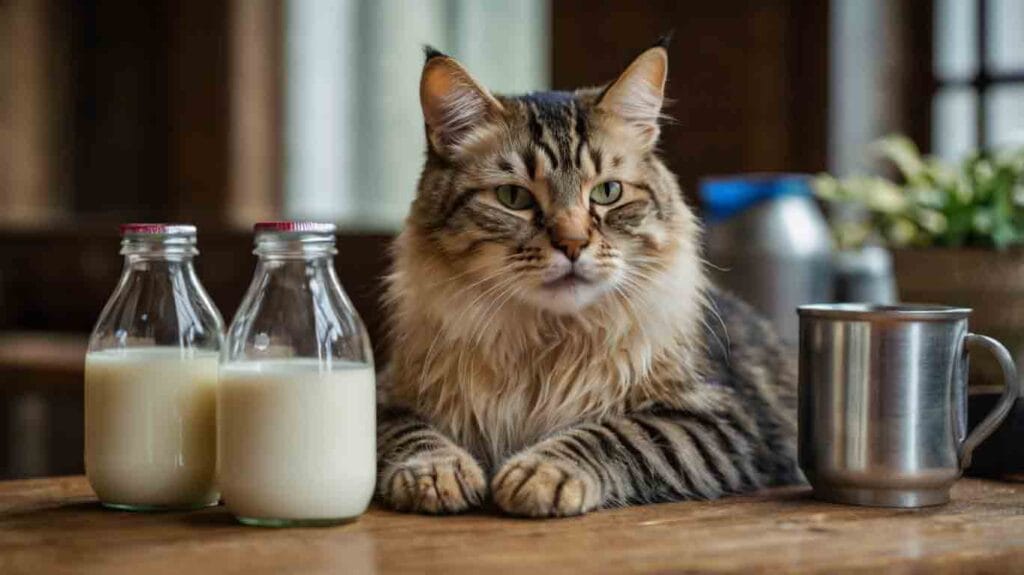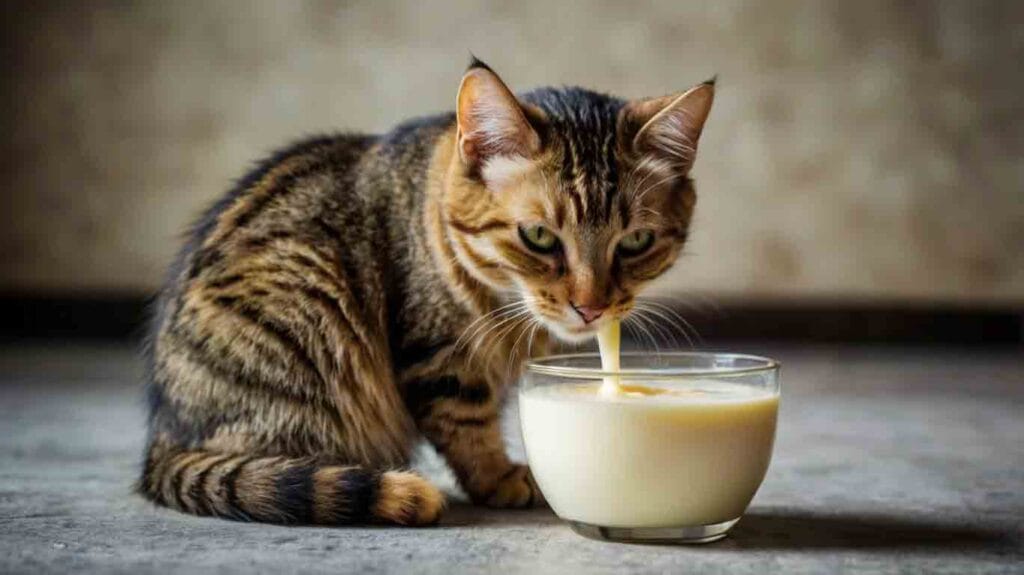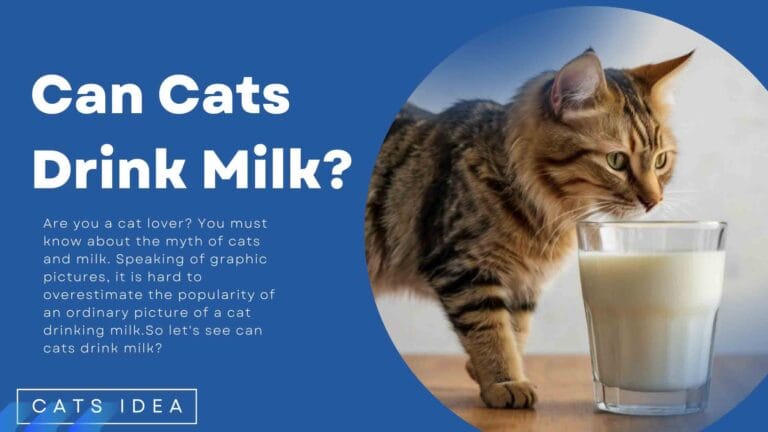Are you a cat lover? You must know about the myth of cats and milk. Speaking of graphic pictures, it is hard to overestimate the popularity of an ordinary picture of a cat drinking milk.So let’s see can cats drink milk?
As kids we grew up knowing that cats are best associated with milk from stories, cartoons, and many other forms of media.
But this stereotype has been around for ages to make this notion a commonly held one.
Following the look of things, one would be forgiven to think that cats and milk are good friends, but the reality is rather different.
Despite this, there are serious consequences if you offer your cat a bowl of milk. Although it could meet your cat’s curiosity needs or may seem like it makes your cat happy, they actually are harmful.
The following sections will provide that insight with details on the reasons as to why milk may not be a good choice for your cat and an insight to their nutritional requirements.
The Biology of cats and Milk
So why on Earth don’t cats go perfectly with milk? It’s all about their stomach.
In addition, most adult cats suffer from lactose intolerance, a process in which by the time adult cats are ready for lactose, they lack a special enzyme referred to as lactase that enables them to digest lactose, a type of sugar found in milk.
What is so interesting is that while kittens are born endowed with this enzyme to help them digest their mother’s milk, the minute they grow and start changing their diets to real ones, lactase production starts to dwindle.
The truth of adult cats is that their body does not produce enough lactase to enable them to digest milk.
If consumed, undigested lactose becomes a food poison, making one’s stomach to bloat, get diarrhea and sometimes stomach cramps.
This is why while most people are aware that cats like to have milk, they will easily suffer from stomach upset when they consume it.
Why Cats Love Milk?
That is why cats are so interested in milk this product is not only useful for strengthening hair but is also quite dangerous for cats.
The truth lays in the abundance of fats in the milk. Cats are meat lovers and simply put have a higher protein and fat needs than dogs of the same size.
In the wild, they look for the fat dense, nutrient calorie sources and since milk is thick and fatty, attractive to them.

The sweetness of milk may also tempt some cats because the aspect of taste that they are most aural to is fatty acids and proteins, which milk contains rather than the sugar content which is the reason why they seem to love it.
This love for milk however does not put it in a healthy standing for them. It just exploits one of their hardwired instincts, that of relishing high calorie, fat contained objects.
Milk and Kittens: Nature’s First Nourishment
- To kittens, milk is a necessity and no kitten would want to miss it at all.
- Kittens especially when born are helpless and deeply rely on their mother for their first three weeks of life, including nourishment.
- This milk is so nutritious because some of the liquids that the body needs for growth and development are present.
- It has proteins fats vitamins, and antibodies which are critical in the immune system of a kitten as well as their early physical development.
- Mother cats’ milk also keeps the kittens hydrated and nursing also defends coziness to the kittens’ systems.
- Kittens start to develop teeth and start walking. as they get older they begin to go off the mother’s milk diet and take to canned and dry foods which are specially formulated to meet their nutritional needs.
- First of all, lunches are fully launched by the moment when in total kittens no longer need a mill for alimentation.
Also read: Why Do Cats Knead? Cats Idea – Vets best answer
Lactose Intolerance: The Major Issue for Adult Cats
Where the issue with feeding the cat milk is that the cat cannot digest lactose as they grow older. While in human beings the lactase enzyme is secreted throughout the entire life, the similar enzyme production decreases in elderly cats.
From this it means that, for most feline species, the act of consuming milk results in neatly uncomfortable digestion.
Some of the poor results of ingesting lactose by cats are vomiting, diarrhea, bloating, and stomach aches.
In fact, the small amount of milk that many of these cats may consume can induce these problems.
Some cats can take milk better than others, but there is no reason to take chances with the health of your pet.
Also read: Why Do Cats Purr? – Best Vet Research – Cats idea
The Risks of Milk for Cats
The dangers of feeding cats with milk can commonly include mild intestinal upsets and other worst-case effects.
Apart from lactose intolerance effects, giving your cat milk causes this cat to gain weight, which can be detrimental to their health if given often as a treat.
Milk is also energy-rich, and high amounts of intake are likely to lead to obesity, a condition that is associated with several risks or complications including arthritis and diabetes.
Further, normal cow’s milk can interfere with nutrient ratios when fed to cats on a regular basis. Cats are obligate, which means they only need animal-based protein, and milk lacks the nutrients that a cat requires.
Also read: How Long Do Cats Live? – Best vet Advice
Is It Safe for You to Give Your Cat Milk?
Though it may make the cat happy by giving it milk via your mug, the best thing you could do is never feed your cat cow’s milk.
In case you normally need to enrich your cat, there are much better options out there.
Lactose free milk is also safer for some cats because it eliminates the lactose, thus making it easier for the cat to digest.
Nevertheless, even Lactose-Free milk should be granted only occasionally, since it is not also a very suitable choice of the nutrition.
Who could have thought that the much-loved animal that people like to pet does not actually require drinking milk at all?
Their main diet should therefore be a high quality cat food that contains the proteins, fats and vitamins which are essential to the welfare of the cats.
Also read: Why Does My Cat Bite Me? – Secret Expert Advise
Cat Specific Milk: Is It a Good Option?
Because of the growing market for cat milk products, many companies have made available special cat milk products.

The milks that cats above are substitutes for actual milk and do not contain any lactose which is known to upset the tummies of cats once ingested.
There are even some foods which contain cat-specific milks, these milks often have added nutrients which are good for cats, including taurine, an amino acid.
All the same, these products, even though are free from eggs, should be served in limited proportions as they are not good for the health as some may believe.
Although there are separate types of milk for cats such as meow mix, it is important not to substitute your cats’ main diet, which should always be the scientifically formulated cat food.
Also read: Why Do Cats Smell Good? – Unlocking the Mystery
If Your Cat Drank Milk
If your cat, by any chance, consumes milk, especially the normal type of milk, then you should observe your cat for signs of intolerance.
Some of the symptoms which a dog may exhibit may include bloating, gas or diarrhea and these may be minor symptoms and may subside on their own but, severe reactions may need the intervention of the veterinarian.
If your cat has had lactose intolerance in the past, then giving your cat milk is not a good idea again in the future.
When your cat develops gastrointestinal issues feed it with water and ensure it sticks to its food plan. If the symptoms continue or even become more severe, consult with a vet for more direction.
Help, My Cat Is Overweight: What You Need to Know
If you are searching for ways to please your cat, perhaps, you should try to switch to those options that would also satisfy the needs of a feline’s diet.
Giving cat treats, a little boiled chicken or fish and toys infused with catnip are the ideal choices if used in moderation and do not negatively affect a cat’s health.
You should develop some sort of treat routine that means you are giving your cat something which is good for them as well as making them happy, without the possible side effects of milk.
wrap up on can cats drink milk?
It is of course, very cute the see a cat having it’s bowl of milk, however it needs to be appreciated that milk is not generally healthy for cats.
This is why milk should not be a constant part of any cat’s diet, it causes lactose intolerance, digestive problems and even increases the likelihood of obesity.
Rather than feeding your cat, milk, choose the right and healthier foods that are suitable for your cat to take.
This post should help you understand what dangers may be lurking in milk and how, with careful measurements to your cat’s diet, they may be avoided so that your pet lives a long, healthy, and joyful life.
Also read: 4 Easy Homemade Cat Food Recipes for Healthy Cats
FAQ: can cats drink milk?
q1: what happens if my cat drinks my milk?
Ans: First, Do not worry. Nothing will happen. so you should not go your vet soon. Everything is fine but sometimes our milks can cause some upset that is it.
q2: what kind of milk can I give my cat?
Ans: Lactose free milk formulated for cats is the best milk one can give his/her cats. The regular cow’s milk should be avoided because most people are intolerant to the lactose present in milk. When serving milk products, ensure you get those that are produced to be taken by cats since they are easier on the cat’s digestive system. It is always important to choose milk exclusively for a pet because it may cause some discomfort for the animal.
q3: what can cats drink besides water?
Ans: In addition to water cats can consume what is known as cat milk. but a form that is free from lactose. But do not give them dairy foods with sugars, or caffeine as these are not good for them. The main beverage that should be offered to your cat always is water.
q4: why do cats love to drink milk?
Ans: People share their cats love to drink milk because it’s thick and has a smell they can easily relate to. This attraction can be derived right from the time they were weaned and fed by their mothers. However, although most adult cats prefer drinking milk, they actually suffer from lactose intolerance and may experience upset stomachs when fed on regular cow’s milk.
q5: can cats drink raw cow milk?
Ans: Contrary to their ability to drink raw cow milk, it is not recommended for cats to have it. Most cats are actually allergic to milk, taking milk can lead to stomach upsets such as diarrohea. If you would like to feed milk, think of lactose-free products produced for cats. It is advisable to seek permission from a vet every time you intend to add some food or beverage to the pet’s diet.
q6: is it okay to drink somthing my cat licked?
Ans: The advice is to swallow it if your cat has licked your drink, provided the cat is well, vaccinated, and taken to the vet regularly. However, avoid sharing if your cat has had some medical condition or the drink contains some bad products like alcohol or caffeine. When in doubt, it’s best to trash it.
q7: can cats drink milk everyday?
Ans: It’s not a good idea for cats to drink milk every day. Milk isn’t good for cats, most adult cats are lactose intolerant. Drinking milk may be hard on your stomach, resulting in diarrhea or upset stomach. Instead give fresh water and a balanced diet. Consider milk more of an indulgence than a habit.
